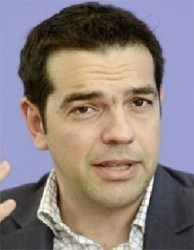WASHINGTON/BRUSSELS, (Reuters) – The International Monetary Fund dramatically raised the stakes in Greece’s stalled debt talks yesterday, announcing that its delegation had left negotiations in Brussels and flown home because of major differences with Athens.

The surprise IMF move came as the European Union told Greek Prime Minister Alexis Tsipras to stop gambling with his cash-strapped country’s future and take the crucial decisions needed to avert a devastating default.
A Greek source told Reuters that the entire Greek delegation that had been negotiating a cash-for-reform deal had also left for home yesterday, citing continuing disagreements.
“There are major differences between us in most key areas,” IMF spokesman Gerry Rice said in Washington. “There has been no progress in narrowing these differences recently and thus we are well away from an agreement.”
Greece needs a deal to unlock aid before the end of the month when it is otherwise set to default on a 1.6 billion euro ($1.8 billion) repayment to the Washington-based IMF.
That could trigger capital controls and possibly push Greece out of the euro zone, with unpredictable consequences for financial markets and the European economy.
Rice said the sticking points remained pensions, taxes and financing. The IMF technical team had returned to the United States but remained “fully engaged” with Athens.
European stocks fell after the IMF comments.
Athens stood by its assertions of recent days that all is not lost. “The Greek delegation, as agreed, is ready to intensify deliberations in order to conclude a deal soon, even in the coming days,” spokesman Gabriel Sakellaridis said.
One official close to the negotiations also cautioned against excessive pessimism, saying the IMF team’s departure represented a break in the talks rather than a breaking off.
IMF experts sit in the “Brussels Group” of technical officials which has been on the sidelines in recent days as the politicians bargained. This suggested there was little point in their staying in Brussels, although they appeared ready to return at short notice if need be.
However, European Council President Donald Tusk delivered an unprecedentedly forthright message to Greece’s radical anti-austerity government after four months of bitter negotiations.
“There is no more time for gambling. The day is coming, I’m afraid, that someone says that the game is over,” he told a news conference after chairing an EU-Latin America summit that was dominated by intense talks with Tsipras on the sidelines.
“It is very obvious that we need decisions, not negotiations,” Tusk said, adding that Athens needed to be “more realistic”.





